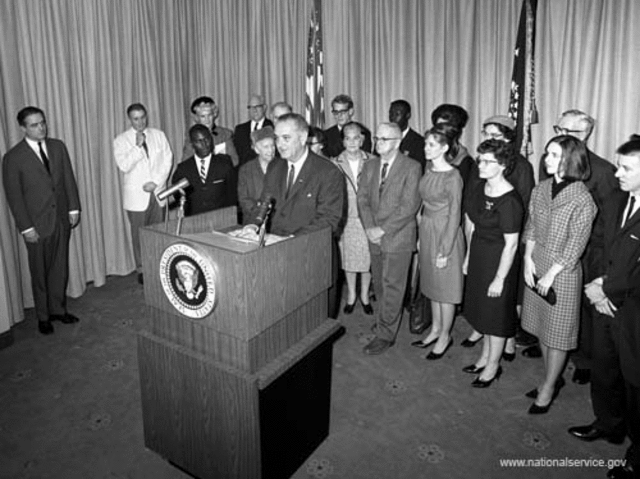Following the passage of the Economic Opportunity Act of 1964, launching the Nation's War on Poverty as a centerpiece of President Lyndon Johnson's Great Society, Community Action Agencies (CAAs) in Georgia and across the Nation were created by citizens of local communities, designated by local government, approved by the Governor's Office, and funded by the Federal Government. Funds were also provided by the Federal Government for the creation and operation of the State Economic Opportunity Offices (SEOOs), responsible for oversight, training and technical assistance, and coordination and liaison with the Office of the Governor.
The agency receives federal, state and local funding from charitable organizations, both public and private. The agency’s programs are multi-faceted and provide many relevant services and activities to low income families.
The agency’s organizational capacity to reach more low income customers is enhanced because of the long standing relationships in the community through the many partnerships and collaborative efforts, along with the provision of volunteer services and other in-kind resources used to enhance the activities offered to eligible citizens.
The agency advocates for the disenfranchised and provides for the delivery of essential services through structured programs designed to improve the quality of life, leads to self-sufficiency, and responsible community involvement among its citizens.
The purpose of the Clayton County Community Services Authority, Inc. is a non-profit community action agency, shall be: To mobilize and utilize public and private resources of Clayton County and any other federal, state or local funds towards the alleviation of poverty in Clayton, Henry and Fayette Counties; The Corporation is organized exclusively for charitable and educational purposes.
Passing the War on Poverty legislation in 1964 was just the beginning. The War on Poverty that President Lyndon Baines Johnson launched in January 1964 became the centerpiece of the domestic reform program that the president called the Great Society. Once that had been accomplished, implementing the program was a daunting task. Contrary to later legend, Congress and the White House did not throw vast amounts of money at the poverty conditions of the United States.
The initial appropriation came to only $1.5 billion, a small amount given the dimensions of the task before Shriver and his agency, the Office of Economics Opportunity (OEO). After the passage of the legislation Johnson turned his focus to other matters. Actually running the War on Poverty was the responsibility of others.
The War on Poverty embraced a number of different programs. The OEO had charge of the Job Corps, a program to put disadvantaged young people to work at centers around the country. Another responsibility was the Community Action Program (CAP), which was designed to give the poor a greater voice in managing their own affairs within cities and towns.
Since this endeavor conflicted with the existing power structure in localities, CAP soon became a controversial lightning rod for the whole poverty war. Less troubled were Volunteers in Service to America (VISTA) and the issue of migrant workers. Other Cabinet agencies had responsibility for various aspects of the antipoverty program.

The centerpiece of the Great Society’s campaign against poverty, the OEO formulated the goals of many domestic programs, including Volunteers in Service to America (VISTA), Head Start, Job Corps, Community Action Programs, Neighborhood Youth Corps, and Summer Youth Programs.
Community Action Agencies (CAA) are local private and public non-profit organizations that carry out the Community Action Program (CAP), which was founded by the 1964 Economic Opportunity Act to fight poverty by empowering the poor as part of the War on Poverty.
CAAs are intended to promote self-sufficiency, and they depend heavily on volunteer work, especially from the low-income community. The Community Services Block Grant (CSBG) is the agencies' core federal funding. Agencies also operate a variety of grants that come from federal, state and local sources. These grants vary widely among agencies, although most CAAs operate Head Start programs, which focus on early child development. Other programs frequently administered by Community Action Agencies include Low-Income Home Energy Assistance (LIHEAP) utility grants and Weatherization Assistance Program (WAP) funded through the U.S. Department of Energy (DOE).
Community Action Agencies (CAAs) promote self-sufficiency and support individuals and families striving to become economically secure while investing in the future of their local communities. Community Action is based on the principle that local control can best provide for sustainable community development, as well as the now-familiar notion that a “hand up” is preferable to a “handout.”
.png?250x229)
.png?250x164)
